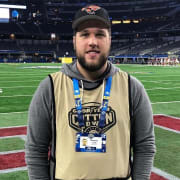Supreme Court Unanimously Rules Against NCAA In Student-Athlete Compensation Case

The Supreme Court of the United States unanimously ruled on Monday morning that the NCAA cannot limit education-related benefits that schools provide to student-athletes, such as free laptops or paid post graduate internships, thus dealing a significant blow to the NCAA’s current business model.
NEW: In a victory for college athletes, SCOTUS unanimously invalidates a portion of the NCAA's "amateurism" rules. The court says the NCAA can no longer bar colleges from providing athletes with education-related benefits such as free laptops or paid post-graduate internships.
— SCOTUSblog (@SCOTUSblog) June 21, 2021
The court focused solely on education-related benefits as part of the case against the NCAA brought on by former West Virginia running back Shawne Alston and did not delve further into the governing body’s other compensation rules.
“Those remaining compensation rules generally restrict student-athletes from compensation or benefits from their colleges from playing sports,” Justice Brett Kavanaugh wrote. “And those rules have also historically restricted student-athletes from receiving money from endorsement deals and the like. I add this concurring opinion to underscore that the NCAA’s remaining compensation rules also raise serious questions under the antitrust laws.
“Nowhere else in America can businesses get away with agreeing not to pay their workers a fair market rate on the theory that their product is defined by not paying their workers a fair market rate. And under ordinary principles of antitrust law, it is not evident why college sports should be any different. The NCAA is not above the law.
“The NCAA couches its arguments for not paying student athletes in innocuous labels. But the labels cannot disguise the reality: The NCAA's business model would be flatly illegal in almost any other industry in America."
The Supreme Court’s ruling comes at a time when 19 states, including Ohio, are preparing to enact legislation that will allow student-athletes to profit from their name, image and likeness.
It’s also the first time since 1985 that the Supreme Court got involved with the governance of college athletics, as it previously ruled that the NCAA was breaking antitrust laws by limiting the number of times a school could appear on television.
NCAA statement on U.S. Supreme Court decision: https://t.co/ouZCl67vdP pic.twitter.com/M0MF3rgk8X
— NCAA News (@NCAA_PR) June 21, 2021
“Even though the decision does not directly address name, image and likeness, the NCAA remains committed to supporting NIL benefits for student-athletes,” NCAA President Mark Emmert said in a statement. “Additionally, we remain committed to working with Congress to chart a path forward, which is a point the Supreme Court expressly stated in its ruling.”
-----
You may also like:
Former Ohio State Track Star Christina Clemons Qualifies For Tokyo Olympics
Ohio State Swimmer Hunter Armstrong Officially Named To U.S. Olympic Team
Eddie George Hires Pepe Pearson, Richard McNutt To Tennessee State Staff
2023 Florida Wide Receiver Brandon Inniss Sets Unofficial Visit To Ohio State
Former USC LB Palaie Gaoteote Appears In Ohio State's Student Directory
The Ohio State Football Program Hosts Eighth Job Fair At Ohio Stadium
Jyaire Brown Becomes Latest Ohio State Pledge To Commit To All-American Bowl
2022 Ohio State CB Target Toriano Pride Commits To Clemson
Big Ten Media Days Will Officially Be Held In Indianapolis In July
Former Ohio State F Jae'Sean Tate Named To All-NBA Rookie First Team
Las Vegas Raiders Sign Former Ohio State LB Darron Lee
Ohio State DE Zach Harrison Named To Lott IMPACT Trophy Watch List
Justin Fields, Adelaide Aquilla Named Ohio State's Athletes Of The Year
Chris Olave, Thayer Munford, Haskell Garrett Named Preseason All-Americans
First Look At Former Ohio State QB Justin Fields In Madden NFL 22
2022 St. Louis CB Toriano Pride Will Announce Commitment On Friday
-----
Be sure to stay locked into BuckeyesNow all the time!
Join the BuckeyesNow community!
Subscribe to the BuckeyesNow YouTube channel
Follow Andrew on Twitter: @AndrewMLind
Follow BuckeyesNow on Twitter: @BuckeyesNowSI
Like and follow BuckeyesNow on Facebook
